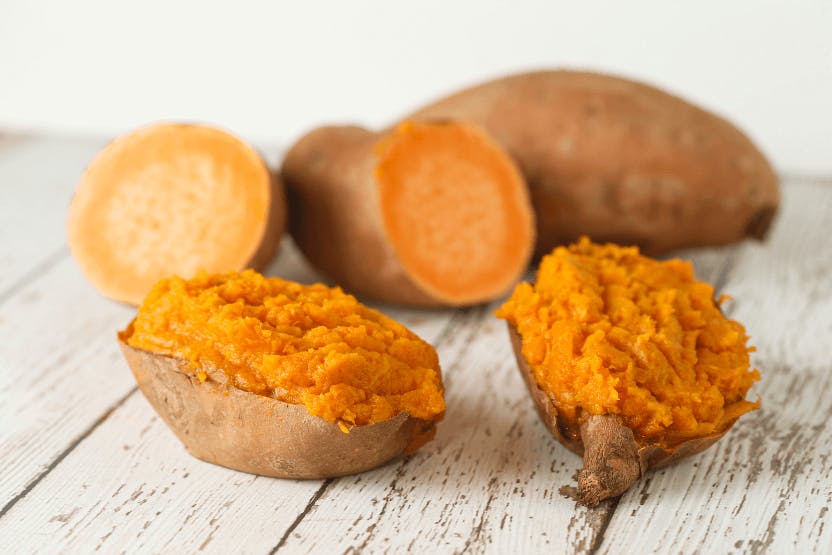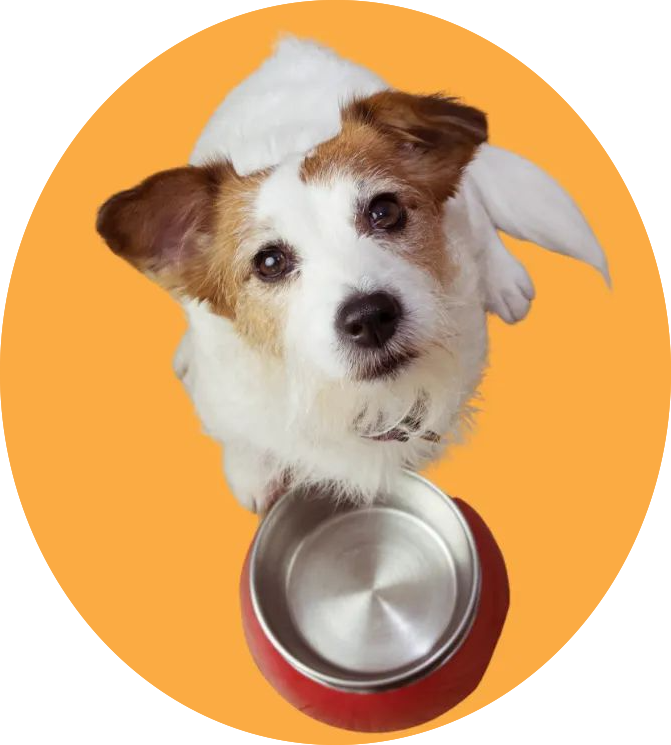Whether you want to make
home-cooked dog food for your beloved pup or give them the odd snack from your plate, you might be wondering — can dogs eat sweet potatoes?
This question has been in the spotlight a lot recently due a potential link between
dilated cardiomyopathy (a type of canine heart disease known as DCM) and grain-free diets. So let’s delve deeper into the latest research and find out if sweet potatoes are good for dogs.
FDA’s Grain-Free Diet Alert
The number of canines diagnosed with DCM has increased significantly over the past few decades, prompting the Food and Drug Administration (FDA) to investigate a potential link between DCM and dogs eating grain-free foods.
While some dogs are known to have a genetic predisposition to the disease including
Dobermans,
Great Danes,
Boxers and
Cocker Spaniels, dogs not prone to DCM have also been getting sick leaving pet owners and vets alike asking, are sweet potatoes good for dogs or should certain grain-free foods be avoided?
What is DCM?
DCM affects the muscle of the heart causing it to become thin and weak. It usually develops gradually, getting more severe with time. While not curable, it can be treated and managed. Typical symptoms of DCM include
low energy,
fainting and a
heart murmur.
Sudden death can occur, even without symptoms, making DCM very worrisome.
Foods Linked to DCM
Foods potentially linked to DCM cases include those containing legumes, with peas being highlighted as the most possible cause in rising DCM cases in dogs. Potatoes and sweet potatoes have also been flagged, however.
The FDA found 16 dog food companies that had ten or more cases of DCM associated with their food. More than 90% of the diets were grain-free and 93% contained peas or lentils. A smaller (but still noticeable) 42 percent of the diets contained potatoes or sweet potatoes.
FDA research continues using a wide range of science-based investigative tools. A statement released on December 23, 2022 also read: FDA does not intend to release further public updates until there is meaningful new scientific information to share.
Are Sweet Potatoes Good for Dogs?
Feeding your dog natural foods without grains or preservatives might have been a priority. But it’s natural to feel concern regarding the FDA update on ingredients such as sweet potatoes.
That said, it’s important to stay grounded. Foods such as peas, pulses, potatoes and sweet potatoes aren’t poisonous or toxic for your dog and have been included in dog food products for years. It also takes most dogs a long time of eating grain-free diets consistently before any signs of diet-related DCM emerge.
From this, it’s possible to make the assumption that the odd bit of sweet potato will not harm your beloved pet. But always speak to your vet if you’re worried or have other questions and concerns regarding your dog’s diet.
It’s also advisable to stay on top of any further FDA updates regarding diet-related DCM. Extensive research is being undertaken and more answers may be available in due time.

Health benefits of sweet potatoes for dogs
While questions are still being asked about the suitability of sweet potatoes for dogs, there’s no denying the nutritional content of these sweet and delicious vegetables. Here are some of the most significant health benefits.
High Fiber
Loaded with fiber, sweet potatoes are great for the digestive system, helping with things such as
constipation and
diarrhea. All that fiber can also make your pup feel fuller for longer, which is helpful for dogs that suffer from
obesity and need to lose a little weight.
Packed with Healthy Antioxidants
Orange and purple sweet potatoes are especially high in
antioxidants. These help to protect your body from free radicals, which can damage your DNA and trigger inflammation. Antioxidants can help prevent things like
cancer and ironically — following the FDA health alert — heart disease.
Bursting with Vitamins and Minerals
Sweet potatoes are packed full of vitamins and minerals. In fact, they have more beta carotene than regular potatoes. This is converted into vitamin A which helps maintain your pup's vision. They’re also high in vitamin C, which can give your dog’s immune system a boost.
One cup (200 grams) of baked sweet potato provides:
A Word of Warning…
Sweet potatoes are high in carbohydrates and should not be a dog’s main source of nutrition. They should not be given to dogs who are overweight or suffer from
diabetes due to a high glycemic index.
Animal protein should form a daily part of a dog’s balanced diet. Fruit and vegetables in moderation can be given as treats or to inspire
picky eaters.
How much sweet potato can I give my dog?
When feeding your canine sweet potatoes, make sure the skin is removed as this could become a potential choking hazard. You can then boil the potato, steam it, or bake it, avoiding any additional seasonings that might unsettle your dog’s digestive system.
Sweet potato fries and chips tend to have salt, sugar and artificial flavoring that could cause an upset stomach, so preparing sweet potato from scratch is the way to go.
Once the sweet potato has been cooked and cooled, you can mix a little into their food or offer it up as a treat. If you’re feeling ambitious, you could even use it as an ingredient in a
homemade dog treat.

Can Dogs Eat Raw Sweet Potatoes?
If you’ve ever prepared sweet potatoes, you’ll know that they’re incredibly hard. Raw sweet potatoes are hard for dogs to chew and if your dog tends to inhale its meals quickly, an
intestinal blockage might occur.
This can be highly unpleasant, resulting in symptoms such as
vomiting,
loss of appetite, straining during bowel movements,
lethargy,
burping,
excessive drooling,
abdominal pain,
abdominal bloating and the inability to get comfortable.
Your dog might pace and refuse to lie down. So if they do accidentally consume a large chunk of raw sweet potato, look out for these symptoms and contact your vet if necessary.
Is It OK to Feed My Dog Sweet Potato Casserole?
As any pet owner knows, dogs love joining in celebratory atmospheres and eating human food. When making a sweet potato casserole for the holiday dinner table or a family get together, it’s best to set aside some plain, unseasoned sweet potato for your canine. This is because some casseroles contain ingredients that might be harmful or toxic to dogs.
A sweet potato casserole with marshmallows, for instance, is loaded with calories and can raise a dog’s blood sugar quickly. This is a big no-no for dogs with obesity or diabetes. Many casserole recipes also include pecans which can be toxic due to a compound they contain called juglone. If you swap out pecans for another nut, this might result in an undiagnosed
nut allergy and a trip to the vet.
So, can dogs eat sweet potatoes as part of a well-balanced and nutritional diet? This is still up for debate. But the key takeaway is that sweet potatoes are not toxic to dogs and should not cause them to be instantly sick.
A high-quality diet is essential for keeping your dog happy and healthy. Digestive problems and food allergies can be expensive to treat.
Compare pet health insurance plans to save more than $270 a year on vet care.


